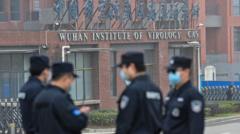In 2020, Germany’s foreign intelligence service, the Federal Intelligence Service (BND), reportedly assessed that there was an 80-90% likelihood of the coronavirus having accidentally leaked from a lab, potentially the Wuhan Institute of Virology. This conclusion emerged from an assessment dubbed Project Saaremaa, which was kept confidential until recently.
Two German newspapers, Die Zeit and Sueddeutscher Zeitung, revealed that the BND had detected instances where the Wuhan lab seemingly engaged in experiments involving viruses that could be modified to become more transmissible to humans. Despite these findings, both the BND and then Chancellor Angela Merkel's office did not release this information publicly at the time.
While the BND’s assessment aligns with a growing skepticism around the natural origins of the virus, officials in China continue to deny any links to lab accidents. China's foreign ministry emphasized that determining the origins of COVID-19 should be a scientific endeavor, referencing an investigation by the World Health Organization (WHO) which concluded that a laboratory leak was "extremely unlikely."
Since that WHO investigation, which took place in early 2021, many scientists have been critical of its dismissal of the lab leak theory as it was addressed in only a few pages of a more comprehensive report. The WHO team spent time in Wuhan, concluding that natural origins via bats and intermediary hosts were the primary pathways of transmission.
The significance of the BND's assessment has gained traction, especially among intelligence communities, including a recent statement from the CIA asserting that a research-related origin is now "more likely" compared to zoonotic transmission, although they maintain low confidence in that assessment.
Ongoing discussions continue around the origins of COVID-19, reflecting a divide in scientific and political circles between the lab-leak theory and natural transmission, with growing calls for transparency in the investigation of the pandemic's beginnings.
Two German newspapers, Die Zeit and Sueddeutscher Zeitung, revealed that the BND had detected instances where the Wuhan lab seemingly engaged in experiments involving viruses that could be modified to become more transmissible to humans. Despite these findings, both the BND and then Chancellor Angela Merkel's office did not release this information publicly at the time.
While the BND’s assessment aligns with a growing skepticism around the natural origins of the virus, officials in China continue to deny any links to lab accidents. China's foreign ministry emphasized that determining the origins of COVID-19 should be a scientific endeavor, referencing an investigation by the World Health Organization (WHO) which concluded that a laboratory leak was "extremely unlikely."
Since that WHO investigation, which took place in early 2021, many scientists have been critical of its dismissal of the lab leak theory as it was addressed in only a few pages of a more comprehensive report. The WHO team spent time in Wuhan, concluding that natural origins via bats and intermediary hosts were the primary pathways of transmission.
The significance of the BND's assessment has gained traction, especially among intelligence communities, including a recent statement from the CIA asserting that a research-related origin is now "more likely" compared to zoonotic transmission, although they maintain low confidence in that assessment.
Ongoing discussions continue around the origins of COVID-19, reflecting a divide in scientific and political circles between the lab-leak theory and natural transmission, with growing calls for transparency in the investigation of the pandemic's beginnings.



















